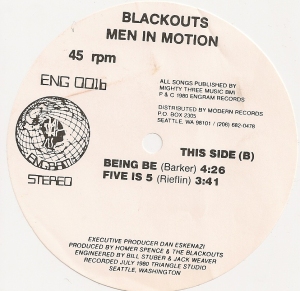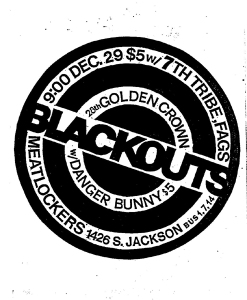The Blackouts’ divided songwriting duties between synthesizer player Roland Barker and singer/guitarist Erich Werner. Werner’s lyrics reflected an intellectual level beyond his years. An example, from “Chipped Beef”:
He said he spoke for you
“Follow that man—he’ll show
you to separate the seed from the chaff”
And that we did
It took time, but we realize
that leaves cling to trees
that may poison them…
The band’s trajectory suddenly changed when Roland’s synth was swiped at a Showbox gig. He then switched to sax, and the balance of power shifted to Erich. The band became darker, less poppy, more sparse. For drummer Bill Rieflin, that was the moment when “the Blackouts became the Blackouts.” Shortly thereafter, bassist Mike Davidson left the band, replaced by Roland’s brother Paul, who went by the stage name Ion. Mike, who never cared for Roland’s poppy synth-driven songs, became a much bigger fan of the Blackouts after he left the band. “I really loved what they did–they became like my favorite group after that,” says Mike. “Shamelessly, I admitted, ‘Yeah, I quit that band, but man they’re great now!'”
By 1982, the Blackouts realized their career options were severely limited in Seattle, and so they decided to head to Boston. Early ’80s Boston had become a vibrant music community. At the time, avant-postpunkers Mission of Burma ruled the scene, with future Seattle producer Chris Hanzsek attending their shows. In any event, the Blackouts scheduled their final Seattle gig at the Oddfellows Hall up on Capitol Hill. Two bands opened: the Horrible Truth, and a fledgling weirdo punk/garage band called the U-Men. Jim Tillman, who played bass for the Horrible Truth and later the U-Men, remembers the Blackouts fondly. “Their recordings literally do not do them justice,” says Jim. “Their live shows were about the most invigorating, visceral, and just wild-eyed experiences.”
Unfortunately for the Blackouts, the Boston venture did not go well. Two years later, the band relocated to San Francisco, and quickly imploded. Ion and Bill ended up in Ministry…Bill also later drummed for R.E.M. Despite the band’s limited national impact, its imprint upon the local scene was incalculable. “The Blackouts were probably THEE proto-grunge template,” observes Larry Reid, who had hosted the band at his Rosco Louie art gallery. “It was sort of a thick, heavy sound.”






